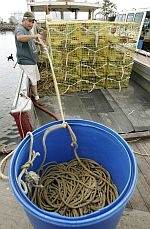 (Host) As lobstermen prepare to set their traps this spring, they’re facing a new way of working on the water. Federal regulations that took effect in April require them to use rope that sinks rather than rope that floats.
(Host) As lobstermen prepare to set their traps this spring, they’re facing a new way of working on the water. Federal regulations that took effect in April require them to use rope that sinks rather than rope that floats.
The idea is to protect endangered right whales whose numbers are estimated at fewer than 400. The whales can become entangled and die in floating fishing gear.
As part of a collaboration with Northeast public radio stations, Maine Public Radio’s Susan Sharon reports that lobstermen are not convinced the rope will do much good.
(Sharon) The new rules affect more than 4,400 lobstermen, gillnet and crab pot fishermen from Maine to Georgia. Those who fish close to shore, such as Long Island Sound lobstermen, are exempt because whales are not known to congregate there. Recently, Maine lobstermen have been lining up in parking lots like this one to turn in their old rope and get vouchers to purchase the more expensive sinking gear.
(James Davenport) "They shouldn’t pass the law but it’s already been passed. And I don’t know if it’s going to help at all. It’s just more money."
(Sharon) Lobsterman James Davenport says it will still cost him thousands of dollars to make the switch. And that’s after he gets a $1.40 a pound for turning in his floating rope through this buyback program. Rope that sinks costs more than twice as much as floating rope.
(Bob Blanchard) "You kinda gotta go with the flow and if the regulations say this is what you need to do, you might as well go ahead and do it rather than beat your head on the wall."
(Sharon) That’s Bob Blanchard, a lobsterman from South Bristol, Maine, who turned in about 350 pounds of old rope. He says some of his peers can’t afford to make the switch. The price of bait and fuel is high and lobster prices fell to a low of two dollars a pound in the fall. Blanchard and others are also skeptical that regulators know the best way to protect whales.
(Blanchard) "They have reasons for what they’re doing. But in 18 years I’ve only seen one whale period. Yeah, you kind of scratch your head, but keep going."
(Sharon) But further south in Cape Cod Bay, people are seeing right whales. Every year researchers from the Provincetown Center for Coastal Studies take to the skies to count right whales who are feeding just offshore. Senior Scientist Dr. Charles Mayo says more than 75 were recently counted.
(Mayo) "They come in every year to Cape Cod Bay around January but the numbers are usually quite low. This year early on the numbers have been quite high."
(Sharon) The increased sightings coincide with some other positive findings about the endangered species. Federal regulators say this year there’s been a record 39 births of right whales. And the confirmed number of right whale deaths has declined. There were just two last year. But not all the recent records about right whales have been good.
(Vicki Cornish) "We’ve had a record number, actually, of entanglements since December. Five entangled whales in the span of just a couple of months."
(Sharon) Vicki Cornish is with the Washington D.C.-based Ocean Conservancy. Two years ago the group joined the Humane Society of the United States in filing suit against the National Marine Fisheries Service, accusing the agency of failing to protect the right whale. Since then the federal government has taken steps to reduce ship speeds and move shipping lanes to prevent collisions with whales. But both ship strikes and entanglements remain two of the biggest human-caused threats to whales.
(Cornish) "Whales are continuing to get entangled at very high levels and over the last 15 years that we’ve been working on this problem those entanglement rates really haven’t changed."
(Sharon) Before this new rule, the rope used to connect lobster traps floated several feet up in the water column. Once caught in a whale’s mouth, the long ropes with traps could be dragged for hundreds of miles, sometimes wrapping around the whale’s head or fins and making it difficult for the whale to swim or feed properly. Charles Mayo says it’s challenging for whale rescue teams to get close enough to safely remove the gear.
(May) "The right whales are probably the most dangerous and difficult animal to deal with at sea."
(Sharon) Meanwhile, as lobstermen adjust to the new requirements in a troublesome economy, federal regulators are eyeing additional restrictions to protect whales. Vertical lines that connect traps to buoys on the surface are also under fire. And many fishermen say if those are eliminated their futures will become as precarious as the right whales’.
For VPR News, I’m Susan Sharon